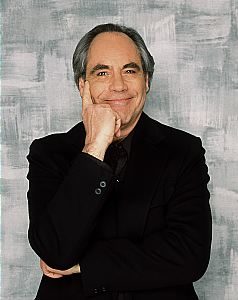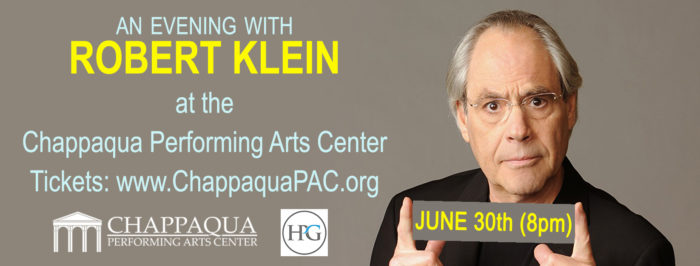Rolling Stones Magazine Named Robert Klein one of the Top 50 Comedians of All Time

Robert Klein will be performing at the Chappaqua Performing Arts Center on June 30th at 8 p.m.. An iconic comedian, Robert Klein has been in the comedy business for over 40 years and continues to have an acclaimed career in comedy, on Broadway, and in film and television. Passionate about making people laugh and sharing his love of comedy with audiences, comedy-legend Robert Klein’s show, “An Evening With Robert Klein,” should not be missed.
Purchase tickets at Ticketmaster:
https://www.ticketmaster.com/Robert-Klein-tickets/artist/702598
or at: www.chappaquapac.org
Recently I had the opportunity to speak with Robert Klein about his upcoming show and his career in comedy:
Julia Bialek: Tell me about your new show! What is it about?
Robert Klein: It’s actually not a “new” show. I’ve written 14 hours of material in my career, but everything seems to be new when people hear about it for the first time! I have developed a large repertoire from the nine HBO specials I did, but I always improvise a little during shows. And this show is particularly fun because it’s local! I live right by the venue.
JB: From where did you draw your inspiration when creating the material?
RK: Everything. When I was starting out, I talked about my short experience as a substitute teacher, which I did after Yale Drama School. Now I talk about being old. There isn’t one theme to my comedy. A million people look at an event or situation, and I look at it, and I find a funny thing in it. That’s my talent, that’s what I have been doing for nearly 50 years. Actually I have been doing it since I was a young boy, but now I don’t get in trouble for it.
JB: Were you a jokester growing up?
RK: Yes. My father was too. I think being a jokester runs in my family. But that is often the case with comedians. It’s an odd way to make a living, but making people laugh is a really wonderful thing. Everyone loves to laugh in good and bad times, and I love to make them laugh. Currently in comedy, a lot of people utilize political satire. I just recently worked with Alec Baldwin on a few episodes of Will and Grace. I reminded him that if he did the material that he does on Saturday Night Live in some other countries, he would be in jail or dead!
JB: Do you have any favorite political material that you have created?
RK: I have often utilized political satire, especially around the time of Watergate. Mind Over Matter was my first comedy album which I devoted a lot of to the Watergate scandal. That is actually the album that influenced a lot of other comedians (Bill Maher, Jay Leno, John Stewart, etc.) to go into comedy since there wasn’t a lot of political satire at the time. The culture was different then, you couldn’t just say whatever you wanted. In fact when I was in a summer replacement show in 1970 with Glen Campbell, I got eight shows and was warned not to do Vietnam materials. My career has spanned all of these changes.
JB: How has stand-up comedy changed over the years?
RK: As I said, one of the changes is that things are not censored anymore. It’s gone too far the other way actually, where profanity is used for shock value, sometimes as a substitute for wit. That’s one way it has changed–anything goes. Additionally, comedy has gotten much crueler than it used to be. They may call it political correctness, but I think caring about feelings is a value to be admired and pursued. It just means courtesy. Another big change, which is remarkable, is that when I started in the industry, stand-up comedy was not thought of as a profession. It wasn’t something where people said, “I want to be a comedian when I grow up.” Now, there are schools teaching it, and universities have stand-up courses. Tens of thousands of people pursue a profession in comedy!
JB: What made you turn to comedy?
RK: I went to college pretty young, at 16. When I was at Alfred University in college, I started on the pre-med track, but chemistry, biology, spelling, comprehension, and physics all got in the way. While I was at Alfred, I participated in some of their amazing productions. The two men that ran the drama department told my dad that they could get me into the Yale School of Drama. My dad was incredulous, saying, “An Ivy League for acting?” But I did get in, and that year of graduate school was valuable in that it immersed me in the business, and it set me in the right direction. My biggest break was being hired by Second City in Chicago. It was, and still is, a great organization where I learned improvisation and set pieces. There was a certain amount of luck in that because I didn’t know how to get started, as I knew no one in business. One thing led to another and I’ve been doing this since I was 23. Except for a few months as substitute teacher and a few summer jobs, I’ve never done anything else in life. I am spoiled in that way: I had success quickly. I’ve been in six Broadway shows, over 40 feature films, hundreds of television shows. I’ve also written a book, a screenplay, and comedy albums. I’ve done everything you can do in show business. Working is natural for me and I’ve never thought of retiring. I love doing this and am doing it better than I have ever done it.
JB: Your work in comedy has influenced so many other successful comedians. What do you believe to be your legacy on the comedy community?
RK: That’s an interesting question. I am proud that there is a documentary about me on Starz Network! Unfortunately produced by Harvey Weinstein, it’s called, “Robert Klein Still Can’t Stop His Leg.” In it, all the famous comedians talk about how I influenced them, which I think is a big part of my legacy. I also think I try to be intelligent and tasteful and not too cruel in my work. I have always stuck to my guns. Yes, I use four letter words from time to time, but we’re adults. I like to use profanity like a good writer would. It’s a matter of class and I always thought my material was pretty intelligent. I put on a total show: I like to sing, and I use original material. In this business, there is a lot of stealing; Dickens could more easily have protected his work in 1850’s London than I can now! I always like being original, and I have never stolen from anyone else. I wrote every word of my comedy materials. It’s a legacy of intelligent, good comedy and making people feel better.
JB: Is there anything particular you are looking forward to for this show?
RK: I’m looking forward to the new venue here. I know it has been open for a year, but I’ve never been inside. I’m excited to see Reader’s Digest, which I pass to go to my dentist, and perform in such an intimate theater. I love live audiences because I feel incredibly fulfilled when I perform. I think that even though I’ve been in show business for a while, I still surprise people, especially because I do some music in my show. I also still get a big kick out of it. So tell everyone to come out and watch. Not that I am worried about it for any particular reason, but comedians have a tendency to die. See me before I die! Is that a good sales pitch? “Come watch me before I die!”

